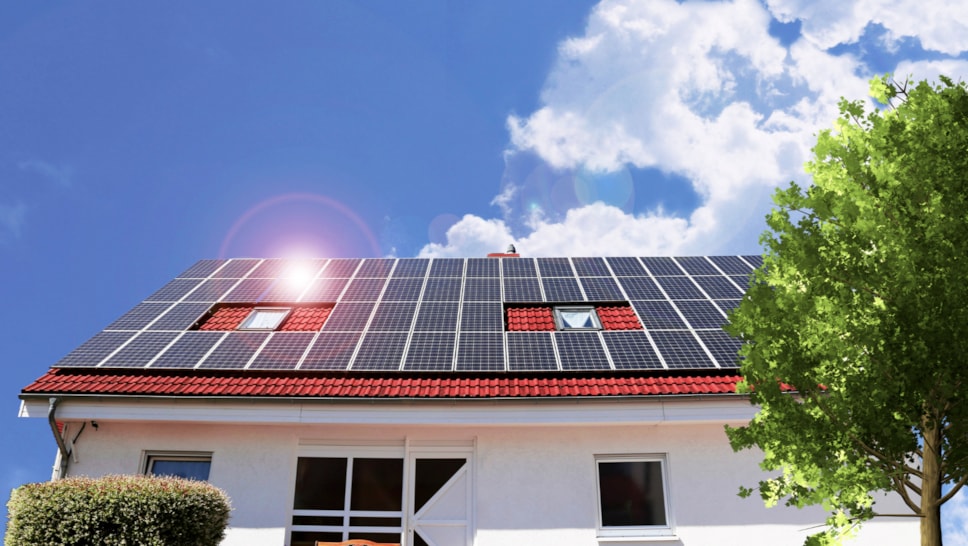
Building a truly circular ‘solar system’ (and we’re not talking about space)
From warehouse to rooftop, we’re cutting some of the waste out of the renewables journey, and making sure solar energy is as green as it can be.
When you see solar panels on a roof, your first thought is probably ‘nice, that family cares about sustainability’. But what you might not often consider is the journey those panels took to get up on the roof in the first place: how they were made, packaged, delivered . . . and eventually, what happens when they’re no longer useful.
Because, as it turns out, even green tech can leave a pretty grey footprint.
While solar panels help cut emissions at home, the way they’re sourced, shipped and disposed of can tell a different story – one of single-use packaging, diesel delivery vans and older but serviceable panels ending up in landfill.
That’s why we’ve joined forces with Segen, the UK’s leading distributor of renewable technologies, to not only power homes with solar energy, but ensure that sustainability is built in to the whole process, from warehouse to rooftop and beyond.
The problem: waste in the system
As solar tech matures, a growing number of panels and batteries are reaching the end of their working lives. Add to that the rise of ‘repowering’ - where perfectly functional but outdated systems are swapped for higher-efficiency models - and we’re looking at a huge wave of recyclable tech with nowhere to go.
And it’s not just the panels themselves when they come to the end of their lives. There’s a hidden waste problem behind the scenes: wooden pallets, oversized packaging and carbon-heavy delivery methods. Without change, the industry risks contradicting the very values it promotes.
So, the solution? Closing the loop – by recycling these products.
Every component of our partnership with Segen is geared toward eliminating waste, extending the life of renewable products, and reducing emissions every step of the way. How we’re doing this…
1. Recycling for repowering
As more customers upgrade their solar systems, we’re making sure the old tech gets a second chance. Through Segen’s parent company Labora, E.ON can tap into a UK-wide network of accredited recycling partners - giving panels and batteries a safe, responsible end-of-life route.
In line with circular economy principles, recycling is only part of the picture. The goal is to keep valuable materials in circulation for as long as possible - whether that’s through refurbishing, reconditioning or reusing components where we can. Recycling is the last resort, but still a vital part of the loop when reuse isn’t possible.
Right now, the solar and storage recycling market is still developing — solar panel recycling is more mature than battery recycling — but the potential is already clear. Glass recovered from panels can be melted down and used again in new panels or even in construction, such as within bricks. Aluminium from panel frames can be reprocessed into new metal products.
As processes become more advanced, we’ll be able to track more precisely where recovered materials go, what they’re turned into, and — ideally — help shape how they’re reused. Because true circularity doesn’t end at collection. It continues all the way through to what those materials become next.
2. Emission-free delivery
Thanks to Segen’s partnership with POSTX, solar kits are delivered from the warehouse to customers’ homes in aerodynamic pods towed by electric SUVs – taking diesel vans out of the equation and reducing the driving emissions. And soon, those same pods won’t be heading back empty. Return trips will collect packaging waste and used pallets, closing the loop in the last mile.
So far in 2025 alone, this service has prevented 467 tonnes of carbon emissions – and it’s only getting started, with more regional expansions in the pipeline.
3. Smarter packaging, fewer pallets
Wooden pallets are essential for shipping goods, as they protect the panels from damage during transit and delivery – but they shouldn’t be single-use. Segen has introduced a reuse scheme, collecting and refurbishing pallets from customer sites.
By year-end, the scheme is projected to cut pallet orders by nearly 10%, with cost savings reinvested into other sustainability initiatives.
We’re proving that a truly circular renewable energy model isn’t just possible – it’s practical, profitable and already in motion.

